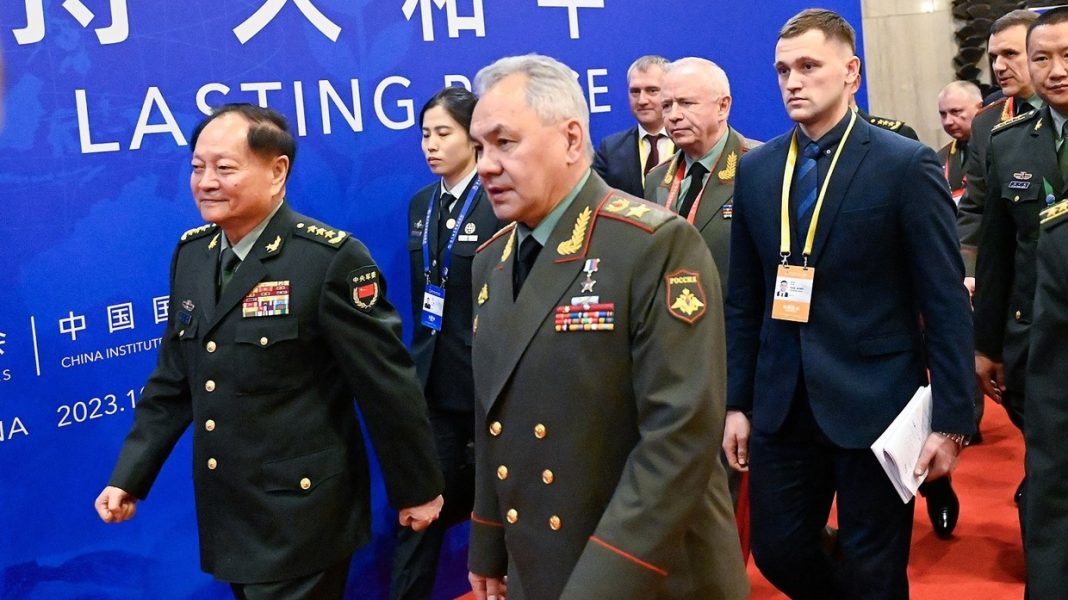“Having orchestrated an acute crisis in Europe, the West is now looking at potentially spreading it to the Asia-Pacific region, and what’s more, in several directions,” Shoigu said.
The minister stressed that the direct involvement of the nuclear-armed states in the confrontation will amplify “strategic risks.”
Shoigu noted that lately the West has been actively pursuing the possibility of deploying its military to the region, on the premise of creating “a joined Euro-Atlantic and Indo-Pacific security alliance,” which would justify the presence of NATO military bases in Asia.
According to the minister, such an approach drastically undermines the principle of unified security, promoted by Russia and China, which Chinese President Xi Jinping calls “a community of shared future.”
Russia – China relations are becoming increasingly more appealing to other countries, Shoigu continued, adding that “the circle of our friends and like-minded people who do not want to be drawn into the confrontational agenda imposed by the collective West is invariably growing.”
Tensions in the Asia-Pacific region have been rising recently, fueled by the standoff over Taiwan between the US and China, which considers the self-governing island to be part of its sovereign territory and has conducted numerous military exercises in the area. Washington recently approved the sale of $440 million worth of military equipment to Taiwan, a move strongly condemned in Beijing.
Meanwhile, the Korean Peninsula has emerged as another flashpoint in the region, with North Korea repeatedly conducting missile tests in response to joint South Korea-US military exercises.
Shoigu also said the US has completely subjugated its Western allies, focusing all their political and military resources on preserving its slipping global dominance by any means necessary.
According to the defense minister, Washington has been undermining and destroying the foundations of international security in its quest for overwhelming geopolitical and military-strategic superiority. The US-led NATO bloc has for years ignored Russia’s legitimate security interests, stubbornly pursuing expansion and eventually forcing Russia to implement “countermeasures” in Ukraine.
“In response, the West openly took a course on inflicting a ‘strategic defeat’ on Russia in the hybrid war unleashed against us. Ukraine was cynically chosen as a battering ram, and assigned the role of merely expendable material,” Shoigu stated.
However, despite Western arms and support, Kiev’s much-touted counteroffensive has failed, Shoigu stressed, noting that Ukraine lost “over 90,000 troops, some 600 tanks and almost 1,900 armored vehicles” since June 4 alone. The Russian armed forces will continue to methodically and steadily carry out their tasks, while ensuring the safety of civilians, he added.
“Modern cataclysms in international relations are directly related to the opposition of individual states to the inevitable strengthening of the multipolar world,” the defense chief added.
“Countries that oppose Western neocolonial dictatorship and defend the principles of equality, polycentricity and indivisible security are subject to fierce pressure, including attempts at political and economic strangulation.”
Speaking on Monday at the 10th Beijing Xiangshan Forum, vice-Chairman of the Central Military Commission (CMC), General Zhang Youxia, also painted a grim picture of the dire straits of present world security.
“Some countries, for fear that the world may stabilize, deliberately create turmoil, interfere in regional issues, interfere in other countries’ internal affairs, and instigate color revolutions,” Zhang warned without naming any countries.
“As we look across the world today, hotspot issues are arising one after another. The pain of war, chaos and turmoil, and loss of life are constantly playing out,” he added.
The Chinese top brass pointed out that certain countries were causing commotion and creating friction because they benefited from war and conflict.
“Behind the scenes, they hand out knives and think nothing of provoking people into wars, ensuring that they’re the ones who benefit from the chaos.”
Zhang also said Beijing was pursuing diplomatic means to resolve its conflict with the United States, seeking to improve military-to-military ties with the Pentagon.
“We are also willing to develop China-US military relations in accordance with the principles of mutual respect, peaceful coexistence and win-win cooperation.”
The US navy regularly sends its warships to what Beijing regards as its territorial waters, but Washington calls them freedom of navigation operations.
